United Kingdom
Will King Charles III address LGBTQ rights?
Homosexuality remains criminalized in dozens of Commonwealth countries
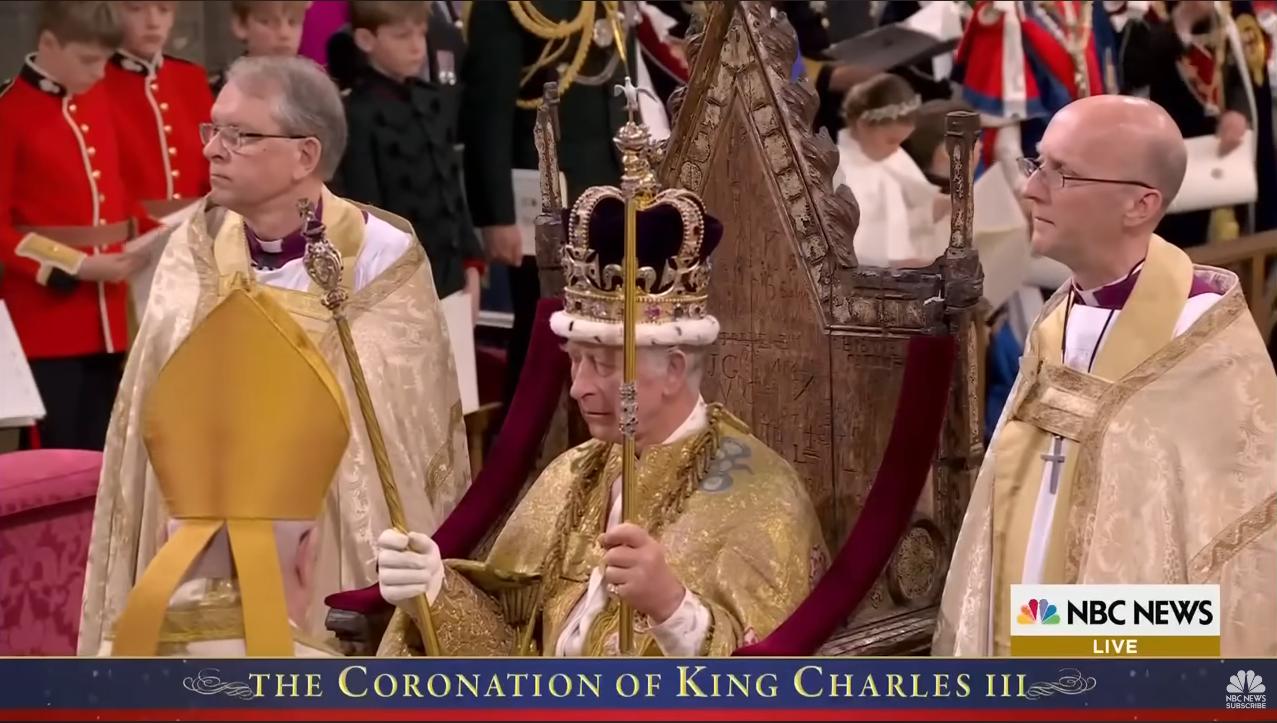
In a solemn ceremony dating back to the Dec. 25, 1066, when William the Conqueror was crowned at Westminster Abbey in London, and 70 years after his mother was crowned monarch on June 2, 1953, Charles III was anointed king by the Archbishop of Canterbury.
The king’s coronation included investiture of his wife Camilla as queen consort. The ceremony is principally a religious recognition as the Archbishop of Canterbury, surrounded by the high ranking principals of other religious orders placed St. Edward’s Crown upon Charles’ head after first giving him the other two symbols of the monarchy, the Orb, which represents the world under Christ, and the Sovereign’s Ring, symbolizing the marriage of a monarch to his people. Charles wore the Coronation Glove and held the Scepter with Cross, a symbol of earthly power, in his right hand.
Watch: King Charles III is crowned as British monarch:
Following the king’s coronation, his wife was crowned as Queen Camilla.
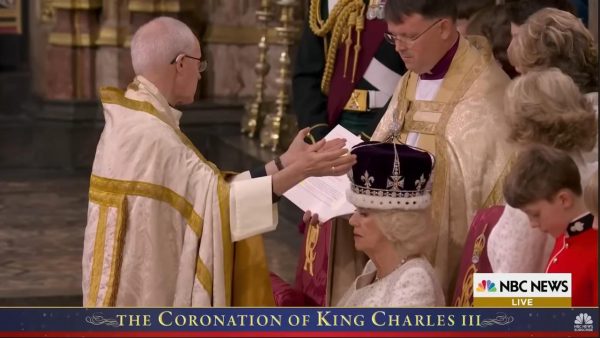
Coronation Day began with the King’s Procession in which the king and Queen Consort Camilla traveled from Buckingham Palace to the Great West Door of Westminster Abbey in the Gold State Coach, which has been used at every coronation since William IV’s in 1831.
Leaving Buckingham Palace, accompanied by the Sovereign’s Escort of the Household Cavalry, the route took the royals past a guard of honor, comprising about 160 members of the three armed services. The 1.42 mile route was also flanked by 1,000 members of the military from the Army, Royal Navy and Royal Air Force.
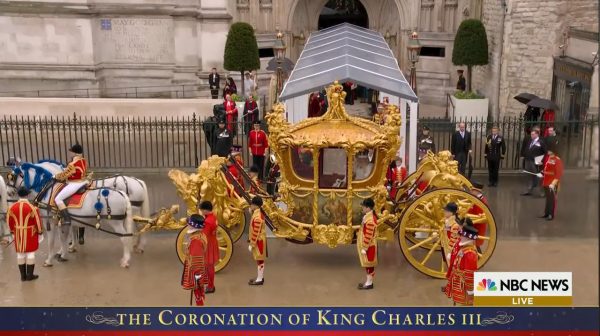
King Charles III’s procession back to Buckingham Palace:
Upon return to the palace under cloudy grey rainy skies the king and the royal family gathered on the balcony to greet the thousands of well-wishers gathered along the Mall. Of note, only members of the working royals were on the balcony with Prince Harry and the king’s brother, Prince Andrew, noticeably absent.
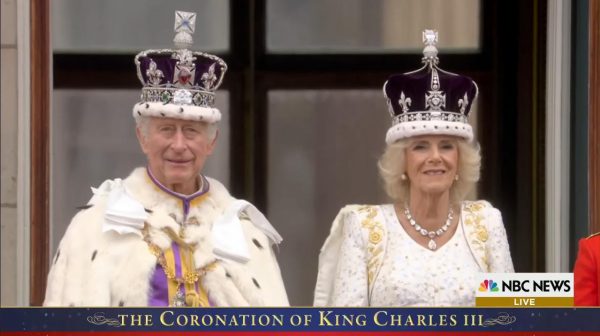
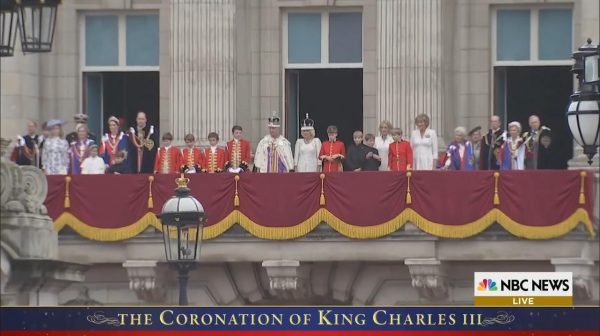
Dignitaries from around the world including world leaders had gathered for the coronation. The U.S. delegation was led by first lady Jill Biden, and in a tweet the president noted: “Congratulations to King Charles III and Queen Camilla on their coronation. The enduring friendship between the U.S. and the U.K. is a source of strength for both our peoples. I am proud the first lady is representing the United States for this historic occasion.”
Congratulations to King Charles III and Queen Camilla on their Coronation. The enduring friendship between the U.S. and the U.K. is a source of strength for both our peoples.
— President Biden (@POTUS) May 6, 2023
I am proud the First Lady is representing the United States for this historic occasion.
Of interest to the LGBTQ community will be the new king’s stance on the issues that impact the LGBTQ community. PinkNewsUK reported that Queen Elizabeth’s 70-year reign saw transformative changes in the U.K., including major laws that advanced LGBTQ rights including the partial decriminalization of homosexuality in 1967 and the Marriage (Same Sex Couples) Act in 2014.
However, the late queen avoided commenting publicly on LGBTQ rights. She kept herself out of social and political issues, and it seems that LGBTQ rights, even in the 21st century, were considered just that.
LGBTQ rights advocates in the U.K. and in the Commonwealth of Nations that the king will now head are waiting to see if the he will more vocal about LGBTQ rights. PinkNewsUK noted that Charles has largely followed in Queen Elizabeth’s footsteps, and there is no record of him speaking on LGBTQ rights.
For the U.K.’s transgender community, especially in Scotland, which passed an updated Gender Recognition Law only to have it blocked by the conservative government of Prime Minister Rishi Sunak, barring it being signed into law by the king in the process known as “royal assent,” the king remaining silent has become problematic according to LGBTQ rights advocates and organizations.
Elton John has previously vouched for Charles, expressing his confidence that the king would use his influence to decriminalize homosexuality in all Commonwealth states.
Same-sex relations remain illegal in many countries once colonized by Britain — many of which now form the Commonwealth.
“Things don’t happen over night. You can’t change a culture and people’s way of thinking over night. But you can certainly step in the water and have a good go. If you don’t step in the water, nothing’s ever going to get done,” John said in 2018, the Gay Times reported.
“I think Prince Charles, when he is made head of the Commonwealth, will do those kind of things.”
Homophobia is one of the many lingering legacies of the British Empire which carried over into the Commonwealth of Nations headed first by Elizabeth and now by her eldest son.
Emma Eastwood, head of strategic communications for Human Dignity Trust, an organization that works with local activists to overturn laws criminalizing LGBTQ people around the world told PinkNewsUK in a May 2 interview:
“Around the world LGBT people are outlawed by legislation criminalizing same-sex sexual activity and through so-called ‘cross dressing’ laws and public order offences, which disproportionately affect trans people,” said Eastwood.
“Many of these laws remain virtually unchanged since they were first introduced in 19th century. The British Empire first tested modern forms of criminalization in its colonies, in India and Australia for example, before introducing them in the U.K. itself,” she explained.
Throughout Elizabeth’s reign, as the British Empire gradually fell away and was replaced by the Commonwealth, many of those former British colonies — now independent countries, have begun working to recant anti-LGBTQ laws.
While some, such as the example of India where same-sex marriage is now being argued before the country’s high court, and in Uganda where a draconian law was passed to essentially imprison LGBTQ people and in neighboring Kenya expel LGBTQ- refugees, there have also been advances. Recently the premier of Australia’s Victoria state castigated anti-LGBTQ groups and in New Zealand lawmakers recently banned so-called conversion therapy and recognized self-identity for trans New Zealanders.
“LGBTQ+ rights across the Commonwealth are changing rapidly, though unevenly,” Eastwood says.
“While a number of countries have recently decriminalised homosexuality, others, such as Uganda, have introduced legislation to enhance existing laws,” she noted.
Eastwood stressed that it is “hugely important that people of all ages in the U.K. are cognizant of colonialism and its after-effects,” and that the government owns up to the nation’s past.
Eastwood pointed out that former Prime Minister Theresa May acknowledged Britain’s role in anti-LGBTQ laws around the world in 2018, calling it “an important and pivotal moment in addressing responsibility and paving the way for increased support for the global LGBT movement.”
“Given this legacy, the U.K. has an important role in supporting LGBT people around the world,” she adds.
The question now is as Charles takes the throne and the reins of both the monarchy and the Commonwealth will the king remain silent, or speak out.
Additional reporting from PinkNewsUK.
United Kingdom
King Charles III unveils memorial to British LGBTQ servicemembers
Ceremony is first time monarch held ‘official engagement’ in support of community.
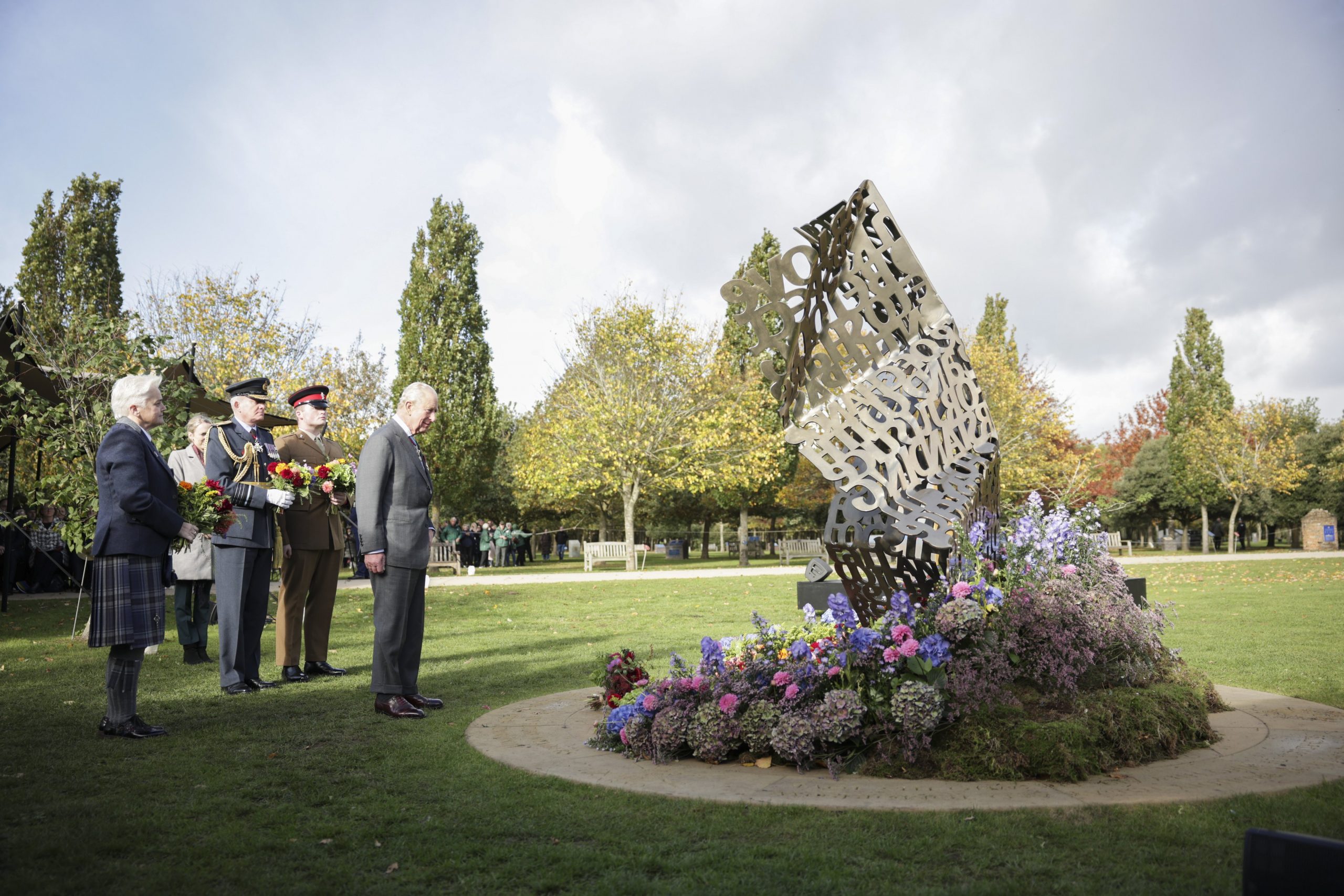
King Charles III on Monday unveiled a memorial to British LGBTQ servicemembers.
The memorial is located at the National Memorial Arboretum in Burton-on-Trent, England.
“We see all the LGBT+ serving members and veterans of the Armed Forces, and we salute you,” said the Royal Family in a social media post that contained a video of Charles placing flowers at the memorial.
“Throughout the 20th century, gay men, lesbians, and bisexual people were banned from serving in the UK Armed Forces,” it adds.
We see all the LGBT+ serving members and veterans of the Armed Forces, and we salute you. 🌈
This afternoon at the National Memorial Arboretum, The King attended the Dedication Ceremony of a new memorial in recognition of all LGBT+ people who have served and continue to serve… pic.twitter.com/tEbkzsQHTG
— The Royal Family (@RoyalFamily) October 27, 2025
“Today marks a historic step for healing and reconciliation,” said the British Defense Ministry.
The BBC notes gay servicemembers could not serve openly in the UK until 2000.
Monday’s ceremony is the first time Charles held an “official engagement” in support of LGBTQ rights.
His mother, Queen Elizabeth II, gave royal assent to the Sexual Offenses Act of 1967, which decriminalized consensual same-sex sexual relations among men in England and Wales who are at least 21, and to a law that extended marriage rights to same-sex couples in England and Wales in 2014. Elizabeth, among other things, also pardoned Alan Turing, an acclaimed World War II codebreaker and computer scientist who died by suicide two years after his 1952 conviction for “gross indecency.”
Then-Prime Minister Rishi Sunak in 2023 apologized to LGBTQ servicemembers who “endured the most horrific sexual abuse and violence, homophobic bullying, and harassment, all while bravely serving this country.”
United Kingdom
LGBTQ Brits fight back against the far-right
Tommy Robinson led Sept. 13 rally in London
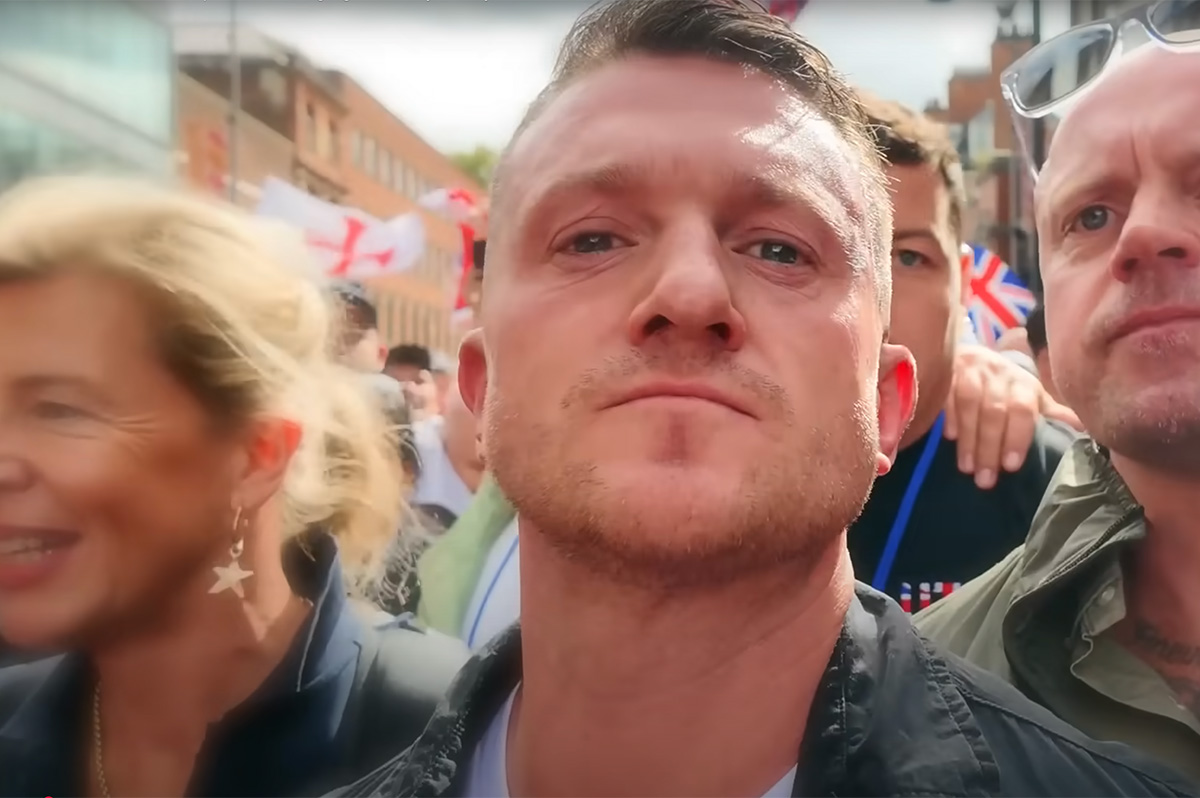
When far-right politics became more and more influential across Europe, fueled by American attempts to spread anti-LGBTQ bigotry in the Western world, LGBTQ people in the UK have begun to furiously fight back.
Let me be clear: when I first came to the UK as a queer asylum seeker in 2018, it was one of the most LGBTQ-friendly countries I had ever seen. But recently, things have changed. The politics toward refugees and trans people have become much harsher.
On Sept. 13, nearly 150,000 people joined a rally led by far-right influencer Tommy Robinson, which left dozens of police officers injured. American billionaire Elon Musk addressed protesters on Whitehall via video link, urging British people to start a revolution against being “too woke.” This protest and this speech are still widely discussed on British TV and social media, or, more precisely, not the news itself but the fear of a far-right turn and the bigoted influence from another side of the ocean it created.
Many local LGBTQ groups, like Worcester LGBT, one of the biggest LGBTQ groups in Worcester, made a statement against these events to a local newspaper:
“These movements often promote anti-immigration, anti-Muslim, and anti-LGBTQ+ views that threaten the safety, dignity, and human rights of many of the people we support. As a network that supports LGBTQ+ asylum seekers and refugees, WLGBT stands firmly against all forms of hate, racism, xenophobia, and Islamophobia. We know from experience that far-right rhetoric can directly fuel harassment, discrimination, and violence — especially for people at the intersection of multiple vulnerabilities.”
And then, there were more reasons to be concerned.
On Sept. 17, when President Donald Trump and his wife Melania visited the UK, many queer people in the UK decided they had had enough. Queer groups circulated information about anti-Trump protests and issued statements.
Trans Kids Deserve Better, a British group for transgender rights led by trans youth, told the Washington Blade:
“Donald Trump is a fascist. He rolled back laws protecting trans rights for both children and adults in America, causing irreversible damage to the trans community. These protections were flawed, but they still mattered. The rollback and rhetoric from Trump are especially harmful for trans youth.
Trump being given a state visit to the UK by Keir Starmer really shows his morally reprehensible stance on trans rights and human rights. While we at Trans Kids Deserve Better have not directly organized anti-Trump protests, we have reposted callouts to walk out of school (organized by Socialist Students) as well as a march organized by UK Stop Trump.
Some people like to pretend that the far right and their anti-immigrant rhetoric have no impact on trans people. Some of these people are actually trans themselves, going along with hate to seem more ‘presentable,’ such as Blaire White and Caitlyn Jenner. At Tommy Robinson’s most recent Unite The Kingdom rally, Elon Musk came on to speak. Musk has made it his mission to destroy the so-called ‘woke mind virus’ and has platformed transphobic organisations such as Gays Against Groomers, who claim all trans people are just confused gay people. By allowing these transphobes to spread their hate, Tommy Robinson is complicit in the hatred against us all.”
Hundreds counterprotested Robinson’s latest rally and thousands protested Trump’s visit, including many LGBTQ people, as the protests were widely promoted by local LGBTQ groups. Stand Up To Racism, which organizing counter-protesters against Robinson and also called the anti-Trump demonstration, has always supported LGBTQ rights and counts many LGBTQ people among its supporters, wich I could say for sure by my own experience with the group.
LGBTQ organizations supporting LGBTQ refugees are especially worried about the rising far-right influence.
Leila Zadeh, executive director of Rainbow Migration, which supports LGBTQ people navigating the UK’s asylum and immigration system, told the Blade:
“The far-right protest left us, and the LGBTQI+ people we support to settle safely in the UK, heartbroken. Hate on this scale drives discrimination and abuse toward people of color, Muslims, immigrants, refugees, and trans individuals across the country. It has been fuelled for years by successive governments and sections of the media to distract from the real problems people face: struggling to buy food, heat their homes, or get a dentist appointment. Instead of scapegoating marginalised groups, we need to come together and demand an end to the divisive rhetoric and cruel policies that dehumanise people and put lives at risk. Most people in the UK welcome refugees, and 80 percent of the British public want an asylum system that is fair and compassionate.”
This rhetoric is not just talked about among LGBTQ pro-immigrants groups.
British screenwriter Russell T Davies, writer of “Queer as Folk” and some of the episodes of legendary sci-fi show “Doctor Who,” has blamed Trump and the British far-right Reform Party, which is also radically anti-refugee, for spreading anti-LGBTQ propaganda, echoing the sentiments of grassroots LGBTQ initiatives.
And maybe this is the one positive outcome of the far-right’s rise; as controversial as it sounds. They reminded the LGBTQ community that the fight for equality is about more than just Prides and drag queen shows. They pushed much of the British LGBTQ community to unite against bigotry in order to prevent a repeat of what happened in the U.S.
It also encouraged mainstream LGBTQ groups, made up mostly of people born in the UK, to stand more mindfully with their LGBTQ refugee siblings, and with refugees, asylum seekers, Muslims, and ethnic minorities in general. At the same time, it made some refugee groups more mindful of LGBTQ rights.
By attacking different minorities, the far right is unintentionally creating unlikely alliances that can deepen people’s understanding of justice and solidarity. It also made British LGBTQ people closer to the American LGBTQ community in their common fight and support toward each other. In the end, this could help make the world a better place. Because everything is connected.
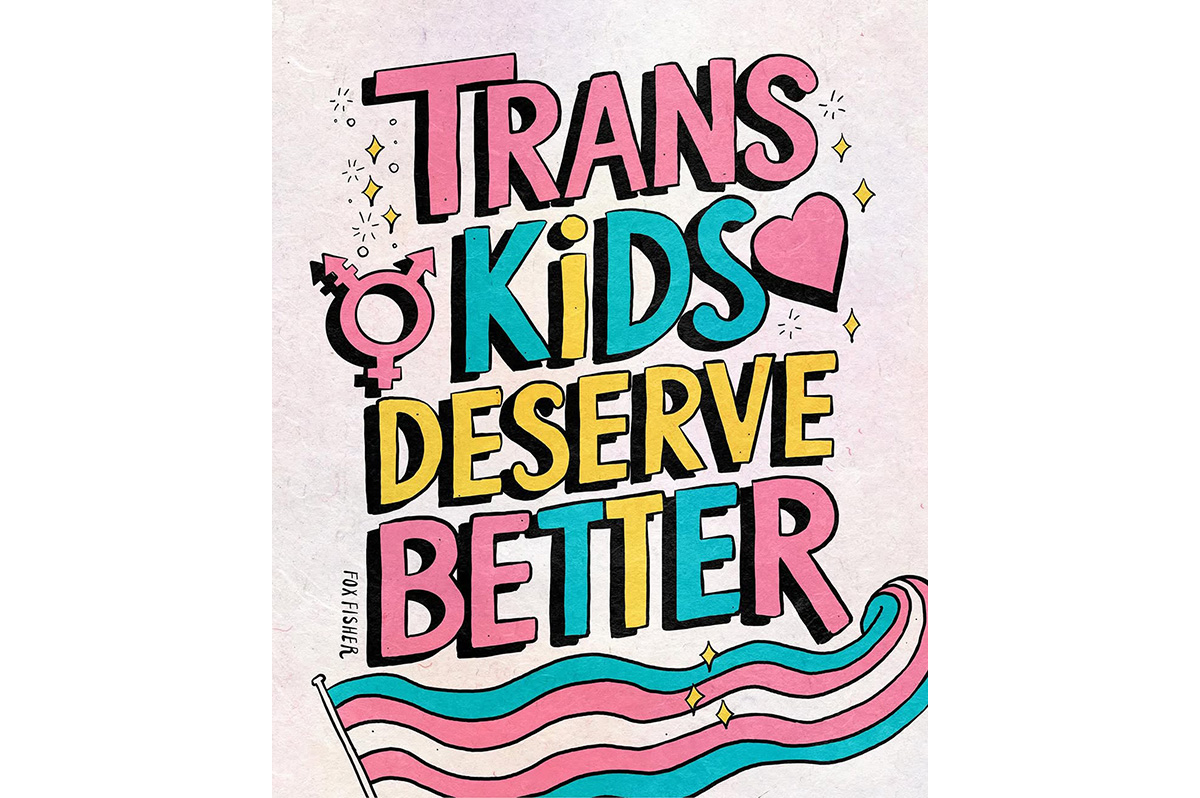
Politicians and the media have recently taken to speaking about trans kids; how to “protect” children who think they are trans.
The problem with such conversations is that the voices of transgender children and teenagers are ignored. Their existence is erased and even denied. Too often, transgender minors are discriminated against in the name of their own “protection.” And only a few have the resources or opportunities to speak up.
But not in the UK.
Despite Britain’s reputation for exporting transphobic ideas around the globe — fueled in part by a vocal trans-exclusionary radical feminist movement, most visibly represented by J.K. Rowling) — the country has one of the most prominent youth-led initiatives there, Trans Kids Deserve Better.
The Washington Blade spoke with their representative, Ashes, to learn more about them, and maybe even learn something from them. After all, the fight for trans rights is global for Trans Kids Deserve Better.
BLADE: Tell us a little bit about the group history.
“Trans Kids Deserve Better (TKDB) was founded in June 2024 by two trans kids after they were driven to action by what they read in the news,” said Ashes, referring to the situation when the British National Health Service started to deny hormone therapy for transgender minors, and conservative transphobic voices became much more prominent in the media. “Our first action was a banner drop on NHS England, which then turned into a four-day occupation as more and more people joined in. What started as a small action group between friends attracted many other trans kids, and eventually, TKDB became a full-scale action network made up of dozens of children throughout the country.”
BLADE: What, in the group’s opinion, is the main problem trans minors face today in the UK?
ASHES: The biggest problems trans kids face in the UK stem from how we are constantly ignored and scapegoated in both politics and everyday life. For example, our British Health Secretary Wes Streeting ignored trans children for whom puberty blockers were life-saving medical care, and instead just banned the usage of puberty blockers for trans kids. Far too often, people pretend we don’t exist. Or they will use trans people — especially in politics — as a means of deflection. Or we are painted as a threat. Both lead to alienation, which creates spaces where trans people can be mocked, harassed, ostracised, not taken seriously, and denied their universal rights. We see this happening everywhere, from school spaces to the government. It is terrifying being villainized and ignored by the very people who are supposed to keep you safe, and it fosters an environment that can be incredibly dangerous to the physical and mental health of trans kids.
BLADE: Tell us a little bit about your most important protests and campaigns. Are they connected? What do you do to reach your goals?
ASHES: Well, most of our actions are separate from each other, but we do also have some continuous campaigns. For example, our campaign Kids Are Dying, Wes (KADW) has been ongoing for over a year and aims to draw attention to and call out Health Secretary Wes Streeting for his role in the puberty blocker ban. We were placing paper coffins outside Wes Streeting’s office to represent the deaths of the trans children caused by his actions. We ended this daily protest just recently, after a full year of no comment from Wes — although he can’t fully pretend we don’t exist, because he blocked our page and KADW on social media. But there’s still more to come from KADW! We are also always coming up with new action ideas.
BLADE: Why do you think it is important for LGBTQ adults to listen to trans kids?
ASHES: Because even LGBT+ adults, who have their own experiences and contribute a lot to activism, will not have the experience of being a trans kid in this exact day and age. Because we’re teens, trans, and have first-hand experience, we have a unique perspective on modern-day education, healthcare, politics, and social media, especially when those topics concern us. When advocating for trans kids, it’s important to include actual kids in these conversations; nobody knows better what trans children need than those trans children themselves.
BLADE: And what about the international meaning of social movements such as Trans Kids Deserve Better? Why can such European campaigns be important for Americans?
ASHES: Recently, Nigel Farage, the leader of the Reform UK party [a far-right political party that has gained more and more influence in the UK] and a blatant transphobe, has said he wants to “Make Britain Great Again,” naming Donald Trump as one of the inspirations for his politics. This is a key example of how British and American politics especially are very interlinked — and so are the rights of minorities across these countries and beyond. Because while wanting rights for trans people and other minorities should not be deemed political, it is. Transphobic rulings passed in one country can inspire the leader of another country to do something similar. Prominent figures in Britain, especially local trans-exclusionary radical feminists, are influential throughout the world — particularly J.K. Rowling, who actively uses her money to campaign against trans rights. But more positively, thanks to social media and the news, trans activism can inspire people from completely different countries to come up with their own actions, or even just give them hope and encourage them to get through the day. We are all fighting the same fight.
-

 National3 days ago
National3 days agoWhat to watch for in 2026: midterms, Supreme Court, and more
-

 District of Columbia4 days ago
District of Columbia4 days agoTwo pioneering gay journalists to speak at Thursday event
-

 a&e features4 days ago
a&e features4 days agoQueer highlights of the 2026 Critics Choice Awards: Aunt Gladys, that ‘Heated Rivalry’ shoutout and more
-

 Colombia4 days ago
Colombia4 days agoBlade travels to Colombia after U.S. forces seize Maduro in Venezuela


















